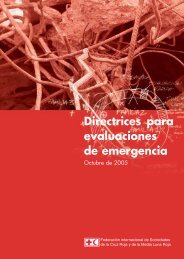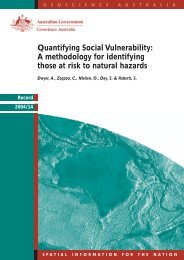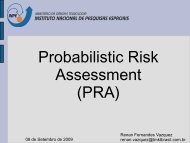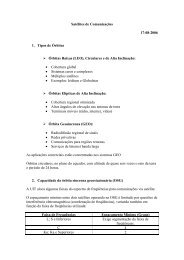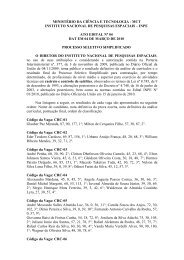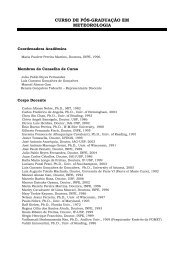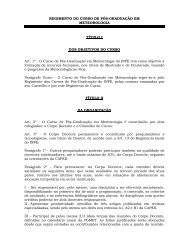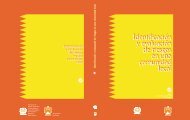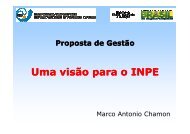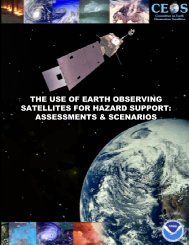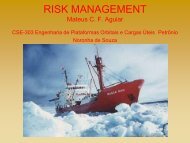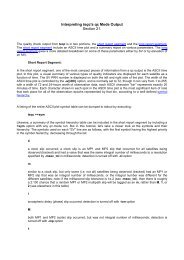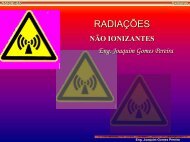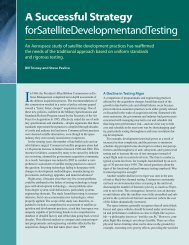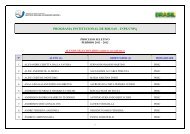Living with Risk. A global review of disaster reduction initiatives
Living with Risk. A global review of disaster reduction initiatives
Living with Risk. A global review of disaster reduction initiatives
Create successful ePaper yourself
Turn your PDF publications into a flip-book with our unique Google optimized e-Paper software.
the United Nations Secretary-General's<br />
reform proposals adopted in 1997, to<br />
promote common objectives, time frames as<br />
well as improved collaboration between<br />
United Nations programmes and funds. It<br />
has been designed as the centrepiece <strong>of</strong><br />
United Nations development cooperation at<br />
country level. UNDAF is primarily a United<br />
Nations instrument to respond strategically<br />
to countries' development challenges<br />
and to the United Nations <strong>global</strong> agenda.<br />
UNDAF is intended to strengthen the<br />
capacity <strong>of</strong> host Governments to implement<br />
their development programmes and<br />
strengthen their relations <strong>with</strong> the United<br />
Nations system. It is complemented <strong>with</strong><br />
Common Country Assessments (CCAs),<br />
carried out between the agencies and the<br />
host country authorities. UNDAF and<br />
CCAs are therefore useful tools for the<br />
incorporation <strong>of</strong> <strong>disaster</strong> risk assessments<br />
and <strong>reduction</strong> measures into inter-agency<br />
assessment and action in a country.<br />
United Nations Development Group<br />
(UNDG)<br />
Web site: www.undg.org<br />
UNDG Executive Committee membership:<br />
UNDP, UNICEF, UNFPA, WFP and<br />
other entities participating as warranted by<br />
their interests and mandates. The Office <strong>of</strong><br />
the Spokesman for the Secretary-General<br />
and the United Nations Fund for International<br />
Partnerships (UNFIP) participate in<br />
UNDG as observers.<br />
UNDG members: DESA, UNDCP, UN-<br />
HABITAT, United Nations Office for<br />
Project Services (UNOPS), United<br />
Nations Development Fund for Women<br />
(UNIFEM), Joint United Nations<br />
Programme on HIV/AIDS (UNAIDS),<br />
UNCTAD, WHO, IFAD, UNESCO,<br />
FAO, the regional economic commissions,<br />
the High Commissioner for Human Rights<br />
and the Special Representative <strong>of</strong> the Secretary-General<br />
for Children and Armed<br />
Conflict.<br />
UNDG, chaired by the UNDP Administrator,<br />
provides a framework for greater<br />
coherence and cooperation in United<br />
Nations development operations. This<br />
Related international commitments and the UN role in <strong>disaster</strong> risk <strong>reduction</strong><br />
enables UNDG members to maximize their<br />
comparative advantages and build on and<br />
support the work <strong>of</strong> other members at the<br />
country level. As most <strong>of</strong> the UNDG<br />
members carry out activities towards <strong>disaster</strong><br />
<strong>reduction</strong> (see previous pages <strong>of</strong> this<br />
section), this group represents an opportunity<br />
to integrate <strong>disaster</strong> <strong>reduction</strong> into<br />
other areas <strong>of</strong> concern, in particular sustainable<br />
development.<br />
The DevLink web site, managed by<br />
UNDG, provides key documents, examples<br />
<strong>of</strong> good practice, training materials, sources<br />
<strong>of</strong> additional information and links to relevant<br />
United Nations and non-United<br />
Nations sites on UNDG areas <strong>of</strong> activity<br />
and in support <strong>of</strong> the implementation <strong>of</strong> the<br />
Millennium Declaration and the Secretary-<br />
General's reform programme, particularly<br />
CCAs and UNDAF.<br />
United Nations Disaster Management<br />
Training Programme (UNDMTP)<br />
Web site: www.undmtp.org<br />
Membership:<br />
United Nations system agencies/organizations:<br />
FAO, IBRD, ILO, International<br />
Organization for Migration (IOM),<br />
OCHA, ISDR, Office <strong>of</strong> the United<br />
Nations High Commissioner for Human<br />
Rights (OHCHR), United Nations Centre<br />
for Human Settlements (UNCHS),<br />
UNCTAD, UNDP, UNEP, UNESCO,<br />
UNFPA, UNHCR, UNICEF, UNITAR,<br />
UNOPS, United Nations Staff College<br />
(UNSC), United Nations Volunteers<br />
(UNV), WFP, WHO, WMO.<br />
Non-United Nations organizations: International<br />
Committee <strong>of</strong> the Red Cross<br />
(ICRC), International Council <strong>of</strong> Voluntary<br />
Agencies (ICVA), IFRC, National Refugee<br />
Commission (NRC), Steering Committee<br />
for Humanitarian Response (SCHR)<br />
Under the management <strong>of</strong> UNDP, DMTP<br />
is an inter-agency tool shared to support<br />
capacity-building activities in the field <strong>of</strong><br />
crisis and <strong>disaster</strong> management by undertaking<br />
training to meet the needs <strong>of</strong> government<br />
personnel, civil society groups,<br />
community leaders and partners in the<br />
323<br />
6



